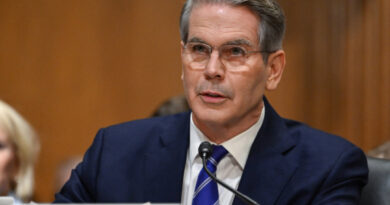New Zealand’s Coalition Government Imposes Tax Cuts Alongside Service Reductions in First Budget.
Finance Minister Nicola Willis has announced a $14.7 billion tax cut package, amidst negative economic forecasts that are prompting plans for further reductions in services.
New Zealand’s Finance Minister Nicola Willis has unveiled her first budget against a backdrop of nationwide protests critiquing the government’s impact on Māori communities. She has honored the National Party’s promise of universal tax cuts with a package costing $14.7 billion (US$9 billion).
Despite National’s campaign pledge of fiscal prudence, Ms. Willis has exceeded expectations with her budgetary decisions.
Labour had initially forecast operating allowances of $3.5 billion for the current year, followed by $3.25 billion next year and $3 billion annually thereafter. In contrast, National had committed to reducing new allowances to $3.2 billion this year, gradually decreasing to $2.7 billion over the term.
However, Ms. Willis has implemented deeper and quicker cuts, canceling over $5.5 billion in new spending over the upcoming four years.
Next year’s spending is only projected to be $2.4 billion, with the minister indicating that this figure will remain constant for the subsequent two budgets. This strategy aims to achieve a surplus earlier than anticipated, in 2028.
The multi-year capital allowance will witness a $7 billion increase.
Ms. Willis presented it as “a Budget geared towards Kiwis facing an enduring cost-of-living challenge,” stating that it signals “hope on the horizon for a prolonged economic slump.”

Despite this positive spin, the budget predictions paint a bleak picture. They reveal lagging productivity and anticipate even slower economic growth than pre-election figures, resulting in a $10 billion weaker economy by 2028.
Even with the scaled-back spending by Ms. Willis, this necessitates increased borrowing, peaking at $207 billion in 2027—significantly higher than the $194 billion forecasted in December of the previous year.
With the new tax brackets, a minimum wage worker can expect an extra $12.50 weekly; a dual-income household earning $150,000 collectively will retain an additional $40 weekly; and a single adult earning $55,000 annually will see a $25.50 weekly increase.
| Tax rate | Current threshold | New threshold |
| 10.5 | Less than $14,000 | Less than $15,600 |
| 17.5 | $14,001 to $48,000 | $15,601 to $53,500 |
| 30 | $48,001 to $70,000 | $53,501 to $78,100 |
| 33 | $70,001 to $180,000 | $78,101 to $180,000 |
| 39 | More than 180,000 | More than $180,000 |
The most significant benefits accrue to families with children in early childhood education, eligible for the Family Boost program. For instance, a couple earning $62,500 each and spending $600 every fortnight on childcare will receive $126 per fortnight.
Moreover, the Working for Families tax credit will see an increase, providing up to $50 extra per fortnight to 160,000 low- and middle-income families with children.
Approximately $3.7 billion of the tax cuts originate from the nearly $6 billion trimmed off costs through reductions in public service jobs and government programs.
Estimations indicate that the vast majority of earners (around 1.6 million individuals) will gain between $101 and $200 annually from the cuts. The subsequent largest group (approximately 876,000 people) stands to receive between $1,001 and $1,043 yearly.
Funding Across Sectors
Health funding is augmented by $8.15 billion over the next three budgets, although National’s pledge before the election to fund 13 new cancer medications has been discarded.
The increase primarily caters to cost pressures, comprising $3.4 billion for hospital and speciality services and $2.12 billion for primary care and public health.
Notable provisions include additional security personnel in emergency departments and expanding the breast screening program to individuals aged 70 to 74.

In contrast, the education sector receives less favorable treatment. School operational grants do not keep pace with inflation, resulting in a real-term reduction despite a $199 million increase over the forecast period.
However, the sector does secure $3 billion in fresh spending, including $1.5 billion for new educational institutions and classrooms, $67 million for structured literacy support, and $477 million for nutritious school meals.
The police are allocated $651 million over four years, with a portion earmarked for delivering an additional 500 officers by the end of 2025, as well as funding for new vehicles and equipment and a $242 million reserve set aside for the imminent decision on police remuneration.
As anticipated due to earlier announcements, there is $28 million over four years designated for boot camps catering to serious repeat juvenile offenders, with an additional $1 million in capital funding distributed among Oranga Tamariki (Ministry for Children and Young People), the courts, the justice sector, and law enforcement.
The national kapa haka festival, Te Matatini, receives nearly $50 million in funding, while there are reductions in the Ministry of Māori Development’s budget.
The country’s aging railway network will benefit from $266 million to finalize overdue track renewals in Auckland and Wellington.
Despite reported incidents of espionage, the recourses of the Government Communications Security Bureau are set to decrease by $30.4 million from the 2024/25 fiscal year until the 2027/28 period, spanning those years.
According to the budget documentation, this will be achieved via efficiencies in various areas, including expenditure on contractors, consultants, training, and travel.
A Return to ‘Trickle Down’: Labour
Leaders of the Labour party have criticized the government for failing to fulfill all its tax cut commitments made before the election. They note that individuals receiving superannuation were initially assured a $13 weekly increase, which has now been curtailed to $4.30.
Labour accuses National of reneging on its pledge to augment education spending at least in line with inflation.
They claim that the finance minister is reverting to “trickle-down economics,” disadvantaging low-income individuals while affording the rich further advantages.
In addition, they object to the $2.9 billion tax reduction for landlords and caution against accepting assertions that the tough budgetary decisions were unavoidable.
“I want to speak to the Kiwis who feel forgotten and left behind by this government,” Mr. Hipkins said. “We see you and we hear you.”
Prime Minister Christopher Luxon responded by characterizing Mr. Hipkins’ speech as “sad, pathetic, and embarrassing” and implying that the Opposition Leader has failed to devise alternative policies.





